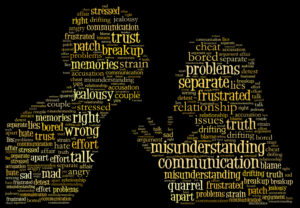Relational Conflicts

Relationships inevitably will alter because people change and continual to grow throughout the life cycle. In the early stages of couple-hood there is unbridled excitement and passion. Typically, the committed couple have an expectation that things will feel wonderful forever. There is the belief that both are on the same page. However, after the initial two year mark differences in beliefs and style of handling situations may differ. Often these observations go unmentioned. The hope is that it will work its way out. Why rock the boat? There may be increased disagreements and differing of opinion that go unaddressed. It is difficult to find the balance of being your own person with beliefs and values to being in a shared relationship attempting to build a solid future together. Relational conflicts worsen when the discussion is not accompanied by problem solving ideas. The couple begin to feel increased frustration and begin to distance from one another. This can lead to doing more things separately which jeopardizes the stability of the relationship. At this juncture, the couple is faced with two courses of action, one being disillusioned and distancing further apart, or recognize they are not taking efforts to strengthen the relationship by investing themselves more in the partnership.
When working with couples the focus is on the communication between you and your partner. The therapist will try to bring into awareness the layers and meanings of what is happening between you rather than what goes on inside one or the other of you. The goal of couples therapy is to improve or restore the communication. Similarly as in individual therapy, the hope is that awareness will yield changes in feelings and behavior within the relationship.
- A successful couple is one that works hard at making decisions that are acceptable to both parties.
- Agree on an acceptable time to talk about your conflicts
- Resolve one topic at a time
- Avoid criticizing, judging, or coercing your partner into what you want. You may win in the short term, but both of you will suffer in the long-term due to feelings of resentment and hurt.
- Avoid stating things you don’t want, rather state your goals for yourself and the relationship
- Remember to stay focused, respectful, and remain on the issue at hand
- Avoid bringing up negative experiences from the past. Its best to remain focused on the here and now
- Be prepared to negotiate, offer something your partner desires, as you request something of him/her. There must be a balance.
- Make sure to reinforce the efforts and accomplishments of your partner in assuring that your needs are met. That is, let him/her know that your needs are met in a loving and appreciative manner.
Unfortunately, couples often have years of built up dissatisfaction, resentment, disgust, and possible loathing, before deciding to enter therapy. Don’t wait until one partner is ready to walk out of the relationship to seek help.
